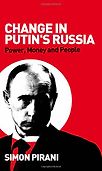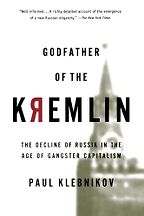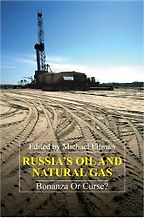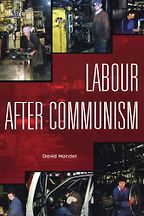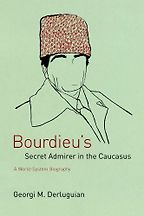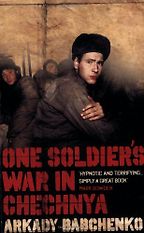Before we get to the books you’re recommending, we’re talking about Putin’s Russia – a subject on which you’ve also written your own book.
Yes, and these are all books I read while writing my own book, along with many others. These books are all very relevant to Putin’s Russia, though some extend back slightly into Yeltsin’s Russia. When I first visited Russia I was involved in left wing politics, social groups and trade unions. I went there first to report on the miners’ movement at the end of the Soviet period, and that was very much my interest. In fact, the book I spent the most energy on was called The Russian Revolution in Retreat, which is about the social history of the early 1920s, because that’s what socialists and radicals argue about – where did it all go wrong after the revolution? I then worked as a financial journalist, so I was writing about Russian companies and the economy, and about natural gas, which is obviously central to the economy. So my second book, Change in Putin’s Russia, is a kind of overview that embraces things that people like me are especially interested in – the labour movement, the social movement, Chechnya and that kind of thing. Also, it has a strong element of looking at the economy, which I think you have to do in order to understand the other things that are going on.
The first of the books you’ve chosen on Putin and Russia is Godfather of the Kremlin.
Yes, I chose it because it takes on a fiendishly difficult subject – the businessman and oligarch Boris Berezovsky and his role in creating Putin. I think anybody who has come to be interested in Russia during the Putin period thinks of Berezovsky as someone who has fallen out with Putin, is in exile in London, showing his skill at manipulating the media. He does that very well. This book is a marvellous reminder of the fact that Berezovsky was an extremely powerful man, perhaps the most powerful man in Russia towards the end of Yeltsin’s term, and actually helped to create Putin the president and to put Putin where he is. That’s a story that Putin doesn’t want to remind the world of, because of course he did not – as his telling would have it – come from a security services background to centralise and rescue the nation, and deal with the oligarchs who had been running riot since the 1990s. He came out of the family circle that surrounded Yeltsin. Those people and the security services camp worked together to find a suitable candidate, a successor. This is an antidote to the popular image promoted by Putin, and shows the connection between the regimes. It’s also by a journalist who took his job very seriously and was killed for doing his job – he was stabbed on the street in Moscow. As usual in these cases, the instigators have never been found. Anna Politkovskaya’s name is internationally known, but Klebnikov’s should be too.
Berezovsky was screwed over quite badly by Putin, though. And I suppose Putin can claim that he did deal with the oligarchs to get back on track, once he’d done what he had to in order to gain power.
It’s true that once Putin decided to change his way of doing things – once he decided to centralise and to curtail the power of the oligarchs – the second oligarch he dealt with was Berezovsky, after [Vladimir] Gusinsky. Yes, he dealt with him very firmly.
Do you personally see Berezovsky and the oligarchs as robber barons or as capitalist martyrs?
Of course they were robber barons. The collapse of the Soviet Union was such that robber barons were bound to come to the top and, if we’re talking about the development of capitalism, very dynamic they were too. [Mikhail] Khodorkovsky, of course, was the most dynamic. What I think happened under the Yeltsin government, however, was that you had a type of capitalism which was unsustainable in capitalism’s own terms. You just cannot run a large capitalist country if you’re going to collect as few taxes as the government was collecting towards the end of the Yeltsin period. For those who think we need capitalism and we need a state to run it – and I don’t count myself among that number – that was an unsustainable model that clearly had to be corrected. Then Putin comes in with colleagues from the security services. It’s about centralisation, it’s about the state having stronger control, and the savagery that was unleashed on Chechnya within weeks of Putin taking over as prime minister. It’s about restoring the strength of the state and having a different balance between the state and private capital. That balance has shifted.
Michael Ellman’s book on oil and gas might explain how.
Partly, yes. People might want to look at it even if they’re not studying economics. It’s the best book dealing with the problem of oil and natural gas. If you think – and I do – that there has been a re-balancing of the state and private capital in Russia, what the re-balancing has been about is oil and gas resources. The biggest fight between Putin and the oligarchs was that between Putin and Khodorkovsky, which Putin won very clearly. Khodorkovsky has now received a second jail sentence, which is clearly punitive and retributive and nothing to do with justice. It’s the oil and gas resources that the fight was over – state ownership of those resources and the tax revenues received. What this book talks about is whether those resources have made Russia better, not only for its ruling elite but for the people as a whole. It’s written in economic language, but it’s such an important question if people are going to understand what’s going on in Russia today. I think the fact that it is a debate incorporating different points of view makes it the best thing to read on that aspect of Russia.
Is an oil economy a curse or a blessing in the end?
There are three short answers. For the elite – both money people and power people (the private capitalists have by no means gone away) – the rising price of oil which continued right up to 2008 has been an enormous asset, and provided resources that could have been used to modernise the economy and take the next economic step. There were a lot of conversations about that but not a lot of progress. Then there was the economic crisis of 2008, which was not of Russia’s making, but the opportunity was lost.
The second point is that for Russia’s population it was a double-edged sword. Most Russian families will tell you that their living standards went up during the 2000s and they pulled away from the 90s disaster. That was a fantastic thing. It was partly due to the side-effects of the oil economy, but the problem was that the opportunity to diversify away and make the economy more than just an oil and gas economy was lost, and the people paying the price for that now are the ordinary people of Russia, not the people who run the country. The final sense in which it was not good is that while the average living standard has increased, inequality widened and some people at the bottom of the scale – single-parent families, poor working families – have got poorer and poorer, and some regions, some poor republics have also been left out.
Your next choice in your list of books about Putin and his rule in Russia is about the auto industry.
Yes. It’s too little known and is by far the best book on the subject. It’s really about the labour movement, the workers’ movement – specifically the autoworkers in Russia – though it includes some research from Ukraine and Belarus. It answers what, for me, is one of the biggest enigmas about Russia in the 90s and the Putin years. Namely, that this country – which has such a big history of revolt and a workers’ movement going back even long before the revolution to peasant revolts and rebellions – has been extremely quiet both during the 90s, when it suffered an enormous slump, a catastrophe in terms of their living standards, and also in the 2000s when living standards have been improving but not equally. Some of these inequalities that emerged so starkly in the 90s have widened in Putin’s Russia.
This book is, first of all, a great account of trade unionism in the car industry, but it goes much deeper into why the labour movement has suffered under the dead weight of communism, and the inertia and fear it produced in a whole generation of Russian workers, even though it was supposed to be a workers’ paradise. The author was deported from the Soviet Union for trying to interview workers who participated in the workers’ uprising in Novocherkassk in 1963. He is the foremost expert on the Russian workers’ movement.
What conclusions does he draw?
His main point is that those years and years of dictatorship were very thorough in the workplace, producing workplace relationships completely unlike anything that people think of in typical capitalist industrial societies. Here the trade union was literally part of the management, and worked not just hand in glove with management but was also a cog in the management wheel. Anyone who tried to have a voice in the workplace was severely dealt with. The shadow of that has lingered, and it’s only now with new generations coming into the workplace that it has begun to change. There are now good news stories about people organising themselves and finding a collective voice, but those stories often concern a younger generation who don’t know the fear of Soviet times.
Your fourth book is Bourdieu’s Secret Admirer in the Caucasus. A few people have chosen this one.
I mentioned before that central to the Putin project was this savage military expedition into Chechnya in 2000 – a war Putin essentially won where Yeltsin had lost. What’s wonderful about this book is that it’s by an academic, a sociologist who comes from southern Russia but who now works in the United States. It takes an unusual look at social relationships in that part of the world, but it does not start with the war in Chechnya or nationalism. He comes from a sociologist’s point of view.
To explain the title, the French philosopher Pierre Bourdieu’s secret admirer is a guy called Musa Shanib who became a rebel fighter. He started off as a member of the Soviet intelligentsia and came to the fore in the Gorbachev period. The author, who had known this guy since he was young, discovered that Shanib was reading Bourdieu, and he takes this as a starting point to look at the way the Soviet intelligentsia ended up in a place they never expected to be. He sees how one section of that intelligentsia joined in with the ripping-off of state property and self-enrichment, and another section joined various types of revolt. The way he unpicks this is marvellous, and is a subtle and unusual approach to that part of the world that confounds our expectations and stereotypes.
We’re staying with the Caucasus for your last choice – One Soldier’s War in Chechnya.
This is a war memoir which has come out of Chechnya. I think in future we’ll look back at it with All Quiet on the Western Front and all the other books that have managed to convey, to those of us lucky enough not to have lived through wars, something of what war is like. It is a universal book about a young guy, conscripted to the Russian army at 18, who went through what many conscripts go through – beatings, bullying by older conscripts and officers, and the shock of being thrown into this most horrible of wars in the 90s. I had the opportunity to see the author speaking a couple of years ago, and it was incredibly moving. He was still young, but had lived and suffered through the unspeakable craziness that war is and, without any formal training as a writer, was able to bring that out in writing. It rivals The Sorrow of War by Bao Ninh about the Vietnam war. It has that same very shocking emotional effect on me as a reader.
Can you sum up the effect that Putin has had on Russia?
There are so many stereotypes about Putin, and too many books that show him in dark glasses on the cover with the Kremlin in shadows. It’s presented as an awful, scary place run by the secret police. There is an element of truth in that, but it’s a one-sided story. Putin’s Russia follows on from Yeltsin. The country is being run by a kind of alliance between the secret services and economic reformers. The private capitalists work within it. I think a more balanced view is needed and that’s what I tried to do in my book.
Get the weekly Five Books newsletter
My own view is that people should have more say in their own destinies than they typically do. I’m a believer in social movements and all the rest of it. Those movements have been relatively quiescent in Russia, but I see many signs of hope that communities are throwing up social movements of all kinds. I would like to see the people of Russia playing more part than they do in shaping its future. Of course, there are dictatorial things about the political set-up that get in the way of that, but people like me commenting from the outside won’t have any say in that. The people of Russia will surely sort all that out in their own good time. People working together from their communities is a force that changes the world for the better, as we are seeing in the Middle East.
September 1, 2011. Updated: August 30, 2022
Five Books aims to keep its book recommendations and interviews up to date. If you are the interviewee and would like to update your choice of books (or even just what you say about them) please email us at [email protected]
Five Books interviews are expensive to produce. If you've enjoyed this interview, please support us by donating a small amount.

